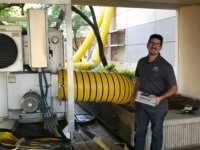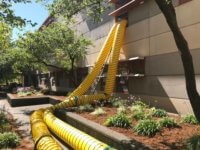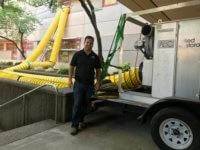Beyond Flooding: The Importance of Dehumidification
Dehumidifying a space is one of the most important steps that should be undertaken in the wake of flooding. Flooding can cause a lot of structural damage in buildings. Once the water damage has been contained and remedied, most people forget to go a step further to dehumidify the home. This step is especially vital if the flooding occurred during bad weather when opening the windows to let in fresh air was not a viable option.
Dehumidifying simply means reducing and maintaining the level of humidity in the air. The process is done using a dehumidifier. Some of the most important reasons why dehumidification should be undertaken after a flooding episode include:
- Elimination of moisture
After a flooding event, drying the areas that were affected by the wetness is very important. Failure to do so may cause mold to grow in the walls, under sinks, as well as any other place as a result of the excess moisture in the air. This can easily be prevented by removing the excess moisture from the air. Switching on a dehumidifier after the flooding with the windo ws closed will help you get rid of all the dampness from the house, effectively preventing opportunistic growth of molds in the process.
ws closed will help you get rid of all the dampness from the house, effectively preventing opportunistic growth of molds in the process.
- For comfort and health purposes
Excessive humidity has been known to trigger allergies. Molds spores, dust mites and mildew are often found in places with very high humidity. People with breathing related conditions such as asthma may als o find it very uncomfortable to live in extremely humid spaces. This is because their allergies will be triggered and they will show symptoms of a reaction. In order to prevent this from happening especially after a flood, you can use a dehumidifier to remove some of the excess moisture from the air.
o find it very uncomfortable to live in extremely humid spaces. This is because their allergies will be triggered and they will show symptoms of a reaction. In order to prevent this from happening especially after a flood, you can use a dehumidifier to remove some of the excess moisture from the air.
- Elimination of musty odor
Moist air has an unpleasant rotting odor. This is often compounded by the opportunistic fungi like mold that grow in such conditions and release their spores into the air. This smell is often described as musty and it can make your life really uncomfortable. A humid room will also smell stuffy and congested. Dehumidification will help lower the level of humidity and efficiently remove the musty odor as well leaving your home smelling fresh and clean.
- For fresher drier air
An extremely humid space normally provides the environment for food to rot faster in the pantry or metal objects around the home to rust. This is never a pleasant sight. Food items such as bread and cereals will have mold growing on them at a much faster rate as a result of the excess moisture in the house. A dehumidifier can rectify this anomaly. By drying out the moisture from the air, the most important condition for the growth of mold and for the occurrence of rust is taken out of the equation. This means that food items will remain fresh and metal objects will stay rust free.
The importance of having fresh air in your home cannot be underscored. A dehumidifier should be part of creating a well-ventilated environment around the house in conjunction with and air conditioning system. The process of dehumidification ensures that you will have no mold growing on walls and ceilings and that your breathing system is working as it should.
At Allied Restoration Co., we highly recommend the use of a dehumidifier in the home or office building in order to prevent mold infestations from starting as a result of excess moisture. Improving the quality of the air that we breathe in is a welcome bonus that comes with taking such precautions.
